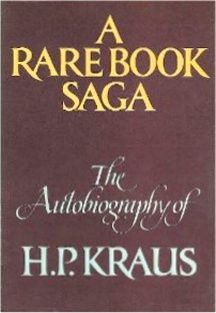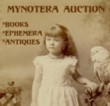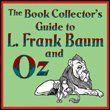|
|
|


Push On, Hit Hard, Follow Through
by Craig Stark
12 September 2011
|
Chapter 7 of bookseller H.P. Kraus's autobiography, A Rare Book Saga, is titled, "I Was a Survivor."
And indeed he was. In the late 1930s Kraus survived not one but two notorious Nazi concentration camps -
Dachau and Buchenwald, which combined to produce nearly 100,000 deaths during WWII. That he was Jewish
made this all the more remarkable. As you might suspect, it's a painful chapter, despite his "omitting
the atrocities I saw," which he didn't entirely, by the way, but I'll leave it to you to read it or not.
What I took away from this and the chapters that followed was the indisputable conclusion that his
experiences had shaped him profoundly and forever. Only his unflagging determination to survive saved
him, and it's no surprise that the storied bookselling career that followed was based on a philosophy
succinctly stated in a later chapter: "Push on, hit hard, follow through."

Kraus was a bloodhound, forever on the trail of the next great book and never letting up. I could choose
any of a hundred or more anecdotes in the Autobiography to illustrate this, but for some reason his pursuit
of the rare 32-line Bible (rarer yet than the more famous 42-line Gutenberg Bible and originally attributed
to Gutenberg) comes immediately to mind.
The Bible was owned in the 1960s by a Major Nigel Martin. Kraus arranged an appointment with him to "examine"
it, not so much as broaching the subject of a possible purchase, and was given "explicit instructions to be
on time." The Major had a train to catch. When a sudden downpour prevented Kraus from getting a cab at the
Ritz, he boldly climbed into the back of a chauffeur-driven Rolls Royce waiting in front of the hotel. The
chauffeur, shouting, asked him to remove himself. "This is a private car," he said, whereupon Kraus begged
his forgiveness, slipped a five-pound note into his hand, and asked to be taken quickly to Trafalgar Square.
He arrived in time, just, to collate the book and assess its value, but alas, "Major Martin entertained not
even the slightest thought of selling his 36-line Bible. It was not for sale, and that was final. Final for
the time, that is. Circumstances and minds can change. Each year I send a Christmas card to Major Martin,
hoping to remind him casually of my interest."
In a recent article, "Object Lessons in the Book Trade," I offered some bookselling advice: If you're
struggling to pay bills, try slowing down. At first glance this would seem to contradict Kraus's approach.
After all, he was very much in a hurry to get to Trafalgar Square - and he recounted many other incidents in
the Autobiography when getting to a location to buy books in a timely manner paid off handsomely. And I believe
all of us have experienced the same thing.
In last week's newsletter I also shared an anecdote about negotiating to buy a collection and, after going back and forth with the seller over the course of several days, I gave up on him. Another contradiction?
Questions or comments?
Contact the editor, Craig Stark
editor@bookthink.com
| Forum
| Store
| Publications
| BookLinks
| BookSearch
| BookTopics
| Archives
| Advertise
| AboutUs
| ContactUs
| Search Site
| Site Map
| Google Site Map
Store - Specials
| BookHunt
| BookShelf
| Gold Edition & BookThink's Quarterly Market Report
| DomainsForSale
| BookThinker newsletter - free
Copyright 2003-2011 by BookThink LLC
|
|








|
|












|


